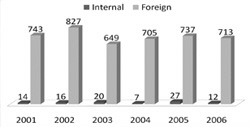 According to the Ministry for Health, Welfare and Family Affairs, for 6 years, from 2003 to 2008, the number of domestic adopted handicapped children was only 135. However, 3,428 handicapped children were adopted in foreign countries, which is over 25.4 times higher than Korea. These days, although social recognition about adoption has improved, people still avoid adopting children with disabilities. Severely handicapped children are difficult to be adopted. It is because Koreans consider particular conditions, such as children’s blood type and the background of their real parents.
According to the Ministry for Health, Welfare and Family Affairs, for 6 years, from 2003 to 2008, the number of domestic adopted handicapped children was only 135. However, 3,428 handicapped children were adopted in foreign countries, which is over 25.4 times higher than Korea. These days, although social recognition about adoption has improved, people still avoid adopting children with disabilities. Severely handicapped children are difficult to be adopted. It is because Koreans consider particular conditions, such as children’s blood type and the background of their real parents. Domestic adoption of a handicapped child is a parents’ worst fear. The attitude toward handicapped children is still unfriendly. Also, there is a problem. These problems make people avoid adoption of the handicapped. Therefore, if parents bring up a child with disabilities, one of the parents has to have whole responsibility to raise the child and care for them. Moreover, the income of the families is reduced, and they have to cope with the expense of traffic, medicine, education, and so on.
In the reality of our society, the adoption system for handicapped children should be supported through a satisfactory policy. For the children’s parents who have to spend millions of won on medical expenses, the financial burden is heavy. The government realizes these problems and expands the support for adopted handicapped child. The range of the subsidy, which is supported by the government for bringing up a handicapped child, will include not only medical expenses, but also consultation costs and rehabilitation costs.
The children with disabilities are adopted abroad because of wrong recognition about disability in Korea. We should be ashamed that most handicapped children are brought up abroad and feel sorry for them. The families who adopt handicapped children are not rich, but ordinary families. The greatest needs for the children are our love and kind consideration for them rather than convenient facilities.


 All
All Feature
Feature






 손은영
손은영













